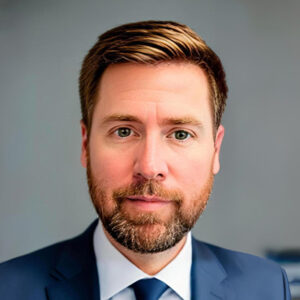
Dialogue has long been at the heart of Josh Ackerman’s teaching philosophy. At the Community College of Baltimore County (CCBC), where he teaches history and political science, he fosters open discussions among students in his honors seminars, encouraging them to engage critically and thoughtfully with complex topics.
 Religion, however, was a topic he believed was best avoided.
Religion, however, was a topic he believed was best avoided.
“It’s not that I’m not a person of faith, I very much am,” he said. “But I would steer the conversation away. I’m not doing that any longer.”
This change in his perspective came through his experience in the ICJS Teacher Fellowship, where he and his fellow educators explored ways to engage religion in the classroom.
Now, he embraces these discussions, understanding that religion shapes many students’ worldviews and should be explored with openness and respect. By prefacing such conversations with clear disclaimers and emphasizing historical objectivity, he creates a space where students feel comfortable sharing their perspectives.
“I’m not here to talk about your particular religion or give guidance about it in any particular way,” he said. “I can give an objective historical understanding, but beyond that, if it influences you and your thinking, let me hear about that. We can go down this road if we’re talking about the influence this has on your thinking.”
Discovering the ICJS Teacher Fellowship
Ackerman’s journey with the ICJS Teacher Fellowship began with curiosity. Having grown up in a religiously diverse environment—his Jewish upbringing juxtaposed with his mother’s Catholic background—Ackerman was already familiar with the intersections of faith and identity. Despite his academic expertise, he recognized a gap in his religious literacy and sought opportunities to deepen his understanding.
After countless times passing the ICJS building, which is close to his home, he finally took the leap and applied for the fellowship, which is tailored for secondary educators (middle and high school students). Given the increasing number of high school students enrolling in college courses, Ackerman successfully advocated for his inclusion, convinced that the program’s emphasis on interreligious dialogue would enrich his teaching approach.
Applying Lessons in the Classroom
One key experience in the Fellowship was the experience of participating in one of ICJS’ facilitated dialogues on Israel and Palestine. “It was in January 2024 and there were about 10 of us in that meeting. And I’m thinking, ‘Are we going to be able to have this conversation?” But the structured dialogue format—which involved writing answers to several questions and having answers read aloud anonymously—and the environment resulted in a rich, although intense experience. “It just seems that ICJS creates an environment that no one else is capable of replicating right now, where dialogue just oozes,” he said.
He is adapting the structured dialogue techniques to his own classroom, leading a series of seminars on Challenging Questions.
“At the first meeting, we won’t just dive in. It’ll be more of, ‘I’m Josh, who are you? Tell me a little bit about yourself: where are you facing these challenges as a student in the classroom? And then, meeting after meeting, the goal is to eventually get to the core of what’s eating at people. ICJS just gave me a wonderful platform,” he said.
His goal is to counteract the growing polarization in academic and social spaces, where students often gravitate toward ideological echo chambers. By teaching them to listen actively and engage respectfully, he hopes to cultivate a generation of critical thinkers who are capable of meaningful civic participation.
A Broader Impact
Ackerman’s passion for dialogue extends beyond the classroom. Inspired by his experiences at ICJS, he has begun exploring chaplaincy, a field that aligns with his deepening commitment to interfaith engagement and pastoral care. He is actively pursuing theological education, considering programs that will allow him to integrate his academic background with spiritual guidance. His goal is to serve as a military chaplain.
“I’ve been guided by a voice of faith for a pretty long time now,” he said. “And I’ve become much more open and comfortable in that pursuit.”